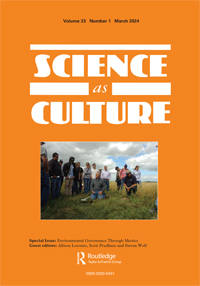Current issue
Environmental Governance Through Metrics
Register now or learn more

Start a new submission or continue a submission in progress
Go to submission siteReady to submit? Start a new submission or continue a submission in progress
Go to submission site (link opens in a new window)To view details of recent special issues, click here.
Our culture is a scientific one, defining what is natural and what is rational. Its values can be seen in what are sought out as facts and made as artefacts, what are designed as processes and products, and what are forged as weapons and filmed as wonders. In our daily experience, power is exercised through expertise, e.g. in science, technology and medicine. Science as Culture explores how all these shape the values which contend for influence over the wider society.
Science mediates our cultural experience. It increasingly defines what it is to be a person, through genetics, medicine and information technology. Its values get embodied and naturalized in concepts, techniques, research priorities, gadgets and advertising. Many films, artworks and novels express popular concerns about these developments.
In a society where icons of progress are drawn from science, technology and medicine, they are either celebrated or demonised. Often their progress is feared as ’unnatural’, while their critics are labelled ’irrational’. Public concerns are rebuffed by ostensibly value-neutral experts and positivist polemics.
Yet the culture of science is open to study like any other culture. Cultural studies analyses the role of expertise throughout society. Many journals address the history, philosophy and social studies of science, its popularisation, and the public understanding of society.
Amidst these journals, Science as Culture is ’the only source of critique of the way science is going’, as one of our readers put it. Not simply criticism, critique analyses the underlying frameworks, assumptions and terms of reference. It emphasizes the fundamental role of values, interests, ideology and purposes -- which would otherwise remain hidden in the guise of neutrality and objectivity. Science as Culture places science within the wider debate on the values which constitute culture; it is not the journal for a particular academic discipline.
Science as Culture encompasses people’s experiences -- at the workplace, the cinema, the computer, the hospital, the home and the academy. The articles are readable, attractive, lively, often humorous, and always jargon-free. Science as Culture aims to be read at leisure, and to be a pleasure.
Book Reviews: Offers of book reviews are welcome. See the list, editorial guidance and contact email address here .
Peer Review Policy
All submitted manuscripts are subject to initial appraisal by the Editor. If found suitable for further consideration, papers are subject to peer review by independent, anonymous expert referees. All peer review is single anonymized and submissions can be made online at http://mc.manuscriptcentral.com/csac.
Publishing EthicsAuthors can choose to publish gold open access in this journal.
Read the Instructions for Authors for information on how to submit your article. If you are considering an article submission to Science as Culture, you can watch this short video with co-Editor Kean Birch where he offers insights on the review process, what to consider when submitting to the journal, and some general tips on academic writing.
Explore the most recently published articles
Environmental Governance Through Metrics
Reach an engaged target audience and position your brand alongside authoritative peer-reviewed research by advertising in Science as Culture.